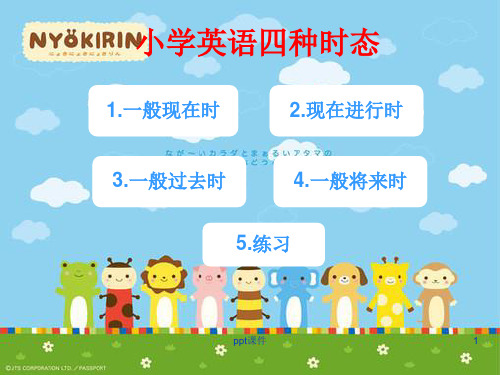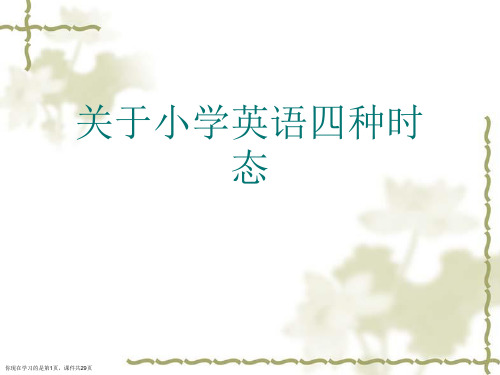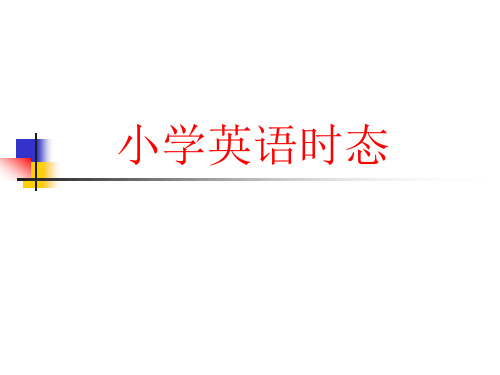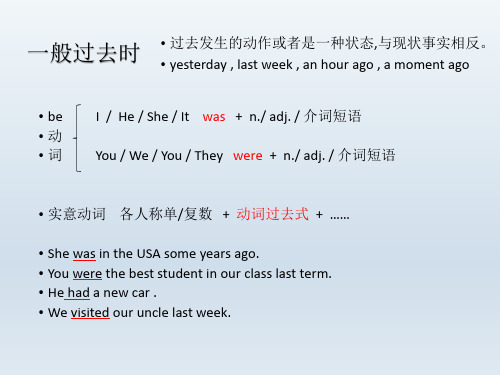小学英语四大时态(课堂PPT)
合集下载
小学英语四种时态 ppt课件

ppt课件 4
3. 一般疑问句 (1)Am / Is / Are+主语+表语+? Is your mother a nurse? 你妈妈是护士吗? Is Polly a bird? 波利是鸟吗? (2)Do+主语+动词原形+其它+? Do you like learning English? 你喜欢学习英语吗? Does your father go to work every day? ppt课件 你爸爸每天都上班吗?
5
4. 特殊疑问句
特殊疑问词+一般疑问句+? What is your father? 你爸爸是干什么的? What do you do every day? 你每天做些什么? When does your mother go to work every day? 你妈妈每天什么时候去上班?
ppt课件 6
13
1.The twins are ___________(wash) the washing clothes now. 2.Look! He is ________ playing(play) basketball over there. 3.Listen! ______ Sally _______(sing)? singing Is 4.What _____(be) you doing (do) are now.
注意,以下情况要使用一般现在时:
• 表示特征、性格和能力。如: Lifeng is a tall boy. 李锋是一个高个子男孩。 That's a big tree. 那是一棵大树。 My skirt is very new. 我的裙子很新。 She can speak English. 她会说英语。 2. 表示经常发生的或习惯性的动作。如: I get up at seven every day. 我每天7点起床。 Classes begin are seven days in a week. 一周有七天。 The earth goes around the ppt sun. 课件 地球绕着太阳转。
3. 一般疑问句 (1)Am / Is / Are+主语+表语+? Is your mother a nurse? 你妈妈是护士吗? Is Polly a bird? 波利是鸟吗? (2)Do+主语+动词原形+其它+? Do you like learning English? 你喜欢学习英语吗? Does your father go to work every day? ppt课件 你爸爸每天都上班吗?
5
4. 特殊疑问句
特殊疑问词+一般疑问句+? What is your father? 你爸爸是干什么的? What do you do every day? 你每天做些什么? When does your mother go to work every day? 你妈妈每天什么时候去上班?
ppt课件 6
13
1.The twins are ___________(wash) the washing clothes now. 2.Look! He is ________ playing(play) basketball over there. 3.Listen! ______ Sally _______(sing)? singing Is 4.What _____(be) you doing (do) are now.
注意,以下情况要使用一般现在时:
• 表示特征、性格和能力。如: Lifeng is a tall boy. 李锋是一个高个子男孩。 That's a big tree. 那是一棵大树。 My skirt is very new. 我的裙子很新。 She can speak English. 她会说英语。 2. 表示经常发生的或习惯性的动作。如: I get up at seven every day. 我每天7点起床。 Classes begin are seven days in a week. 一周有七天。 The earth goes around the ppt sun. 课件 地球绕着太阳转。
小学英语易混淆时态PPT 四大时态讲解

2 every(+year/month/week/day...)(每一......) 3 now(目前)... • eg:Jack often plays football with Tom .
•
Sally have breakfast every morning.
3、基本结构
• ① be动词(is/am/are); • e.g:I am a teacher. (现在的状态)
7. He ________ football now, but he _______ basketball just now. (play)
8. we ________(have) a meeting next Monday. 9. —________he________ (clean) the classroom? —No, he isn't. He________ (play).
2. 写出下列动词的第三人称单数
drink________
go________
have________
do________
buy________
carry________
watch________
teach________
play_______
brush________
三、现在进行时
现在进行时
—No, he isn't. He _is__p_la_y_i_n_g (play).
基本结构
② 行为动词(基本用原形,但主语三单动词要加 s/es)
e.g:He goes to school every day.
Katie often has breakfast at 7:15.
小学英语时态-PPT

一般现在时
(2) 当句子中即没有be动词,也没有情态动词时 ①陈述句:We get up at 7:00 every morning. 疑问句→Do you get up at 7:00 every morning? 否定句→We don’t get up at 7:00 every morning. ②陈述句:She has a little brother. 疑问句→ Does she have a little brother? 否定句→ She doesn’t have a little brother.
现在进行时
1. The boy is playing basketball. 否定句:____________________________ 一般疑问句:_________________________ 肯定回答:__________________________ 否定回答:__________________________
12. We _________ (not watch) TV on Monday.
13. Nick_______ (not go) to the zoo on Sunday.
14. They _________ (like) the World Cup?
按要求完成句子
1.Do you often play football after school? (肯 定回答) 2. I have many books. (改为否定句) 3. Gao Shan’s sister likes playing table tennis (改为否定句) 4. She lives in a small town near New York. (改为一般疑问句) 5. I watch TV every day. (改为一般疑问句) 6. David has got a goal. (改为一般疑问句)
小学英语四种时态课件

+ing
ask
以不发音的e结尾 的,去e,+ing
write take
重读闭音节以一个 辅音字母结尾的, 双写这一字母+ing
get run swim
going
asking writing taking getting running swimming
你现在学习的是第13页,课件共29页
1.The twins _a__r_e_w__a_s_h_in_(gwash) the
你现在学习的是第2页,课件共29页
一般现在时的构成
1. 肯定句
(1)主语+am / is / are+表语
They are new students. 他们是新生。
(2)主语+行为动词+其它 I read English every night. 我每天晚上读英语 。
你现在学习的是第3页,课件共29页
词过去式改为实意动词的原形.
(四)提问:
What? When ? Where? How?
你现在学习的是第17页,课件共29页
动词-ed形式的构成:
在动词后加-ed
want
以字母e 结尾的动 词,只+d
“ 辅音字母+y ” , 变y 为i, 再+ed
重读闭音节以一个 辅音字母结尾的, 双写+ed
answer move
你现在学习的是第23页,课件共29页
小学英语动词的时态练习
❖ 一、选择填空:
❖ ( )1. Look! Li Ping and Li Ying ________ basketball now. ❖ A. play B. played C. are playing D. will play
小升初小学英语四大时态(课件)人教PEP版英语六年级下册

现在进行时
句型:主语+be+动词ing Tom is doing his homework.
第一人称+am+动ing 第二人称+are+动ing 第三人称+is+动ing 口诀:我用am,你用are,is用在他她它,单数名词使 用is ,复数名词使用are 定义:现在进行时表示现在或当前一般时间正在进行 的动作常与Listen,Look,now,Watch out…连用
cleaning
一般将来时
定义:表示将要发生的事或打算、计划、决定要 做的事情。常与tomorrow, tonight, next week/ weekend/ month/ year, this morning/ afternoon/ evening…连用
句型:主语+be going to+动词原形 主语+will+动词原形
现在进行时
动词ing的变化规律: 1)直接加ing ,如: open-opening, clean-
cleaning… 2) 去掉词尾不发音的e ,如:take-taking, come-
coming, have-having, become-becoming … 3) 重读闭音节的,双写最后的字母,加 ing , 如:
last year. 去年李梅总是步行上学。
动词过去式的规则变化
①一般情况,直接加上-ed。如:look-looked。 ②以不发音的字母e结尾的动词,加-d。如:
live-lived。 ③以重读闭音节结尾,先双写辅音字母,再加-
ed。如:stop-stopped
④辅音字母+y结尾的动词,先变y为i,再 加-ed。如:study-studied。
小学英语四种时态 谢PPT课件

9
4.There are (be)four seasons in a year.
5.Lily ____is____ (be) a tall girl. 6.I go (go)shopping once a week.
10
现在进行时(Present Progressive)
概念: 表示现在正在发生的动作h 或存在的状态
2. 表示经常发生的或习惯性的动作。如: I get up at seven every day. 我每天7点起床。 Classes begin at eight.8点开始上课。
3. 表示客观事实和真理。如:
There are seven days in a week. 一周有七天。
The earth goes around the sun. 地球绕着太阳转。
(四)提问谓语: What did + 主语+ do…? 如:Tom did his homework last night.
What did Tom do last night?
15
动词-ed形式的构成:
在动词后加-ed
want
以字母e 结尾的动 词,只+d
“ 辅音字母+y ” , 变y 为i, 再+ed
8
1.The twins ___w__a_s_h____(wash) the
clothes every day.
2.Sometimes he __p_l_a_y_s__ (play)
basketball over there.
3.How often d_o__e_s Sally _s_i_n_g__(sing)?
7
注意,以下情况要使用一般现在时:
4.There are (be)four seasons in a year.
5.Lily ____is____ (be) a tall girl. 6.I go (go)shopping once a week.
10
现在进行时(Present Progressive)
概念: 表示现在正在发生的动作h 或存在的状态
2. 表示经常发生的或习惯性的动作。如: I get up at seven every day. 我每天7点起床。 Classes begin at eight.8点开始上课。
3. 表示客观事实和真理。如:
There are seven days in a week. 一周有七天。
The earth goes around the sun. 地球绕着太阳转。
(四)提问谓语: What did + 主语+ do…? 如:Tom did his homework last night.
What did Tom do last night?
15
动词-ed形式的构成:
在动词后加-ed
want
以字母e 结尾的动 词,只+d
“ 辅音字母+y ” , 变y 为i, 再+ed
8
1.The twins ___w__a_s_h____(wash) the
clothes every day.
2.Sometimes he __p_l_a_y_s__ (play)
basketball over there.
3.How often d_o__e_s Sally _s_i_n_g__(sing)?
7
注意,以下情况要使用一般现在时:
小学英语时态 ppt

非单三:I; you; we; they; 复数& 单三:he; she; it; 单个人如my father ;your
sisiter;单个物the cat; the dog&
一般现在时
动词变单三: 1 直接加s; 如: come-comes 2 以o; x; s; sh; ch 结尾+es ; 如: do--does;
7. Wang Kai and Wang Li__h__a_v__e havelunch
every day.
8.We often__p__l_a_y_ play in the playground. 9. Chen Jie sometimes __g_o__e_s___go to the
park with her sister.
4. We _____A___ music and often __________ to
music.
like; listen B. likes; listens C. like; are listening
5. She sometimes _____C__ up at six in the
小学英语时态
四种时态
一般现在时 现在进行时 将来时 过去时
一般现在时
一般现在时:表示经常性的事情;习惯性 的动作或一般性事实& 时间状语: often 经常; usually通常; always 总是;every day每天;sometimes 有时等&
句子结构:1.主语+is/am/arebe 动词+其他 2.主语非单三+动词原形+其他 3.主语单三+动词s或es+其他
疑问句→Do you get up at 7:00 every morning? 肯定回答:Yes;we do. 否定回答:No;we don't. 否定句→We don’t get up at 7:00 every morning. ②陈述句:She has a little brother. 疑问句→ Does she have a little brother? 肯定回答:Yes; she does. 否定回答:No; she doesn't. 否定句→ She doesn’t have a little brother.
sisiter;单个物the cat; the dog&
一般现在时
动词变单三: 1 直接加s; 如: come-comes 2 以o; x; s; sh; ch 结尾+es ; 如: do--does;
7. Wang Kai and Wang Li__h__a_v__e havelunch
every day.
8.We often__p__l_a_y_ play in the playground. 9. Chen Jie sometimes __g_o__e_s___go to the
park with her sister.
4. We _____A___ music and often __________ to
music.
like; listen B. likes; listens C. like; are listening
5. She sometimes _____C__ up at six in the
小学英语时态
四种时态
一般现在时 现在进行时 将来时 过去时
一般现在时
一般现在时:表示经常性的事情;习惯性 的动作或一般性事实& 时间状语: often 经常; usually通常; always 总是;every day每天;sometimes 有时等&
句子结构:1.主语+is/am/arebe 动词+其他 2.主语非单三+动词原形+其他 3.主语单三+动词s或es+其他
疑问句→Do you get up at 7:00 every morning? 肯定回答:Yes;we do. 否定回答:No;we don't. 否定句→We don’t get up at 7:00 every morning. ②陈述句:She has a little brother. 疑问句→ Does she have a little brother? 肯定回答:Yes; she does. 否定回答:No; she doesn't. 否定句→ She doesn’t have a little brother.
小学英语精美课件-时态讲解-通用版(共22张PPT)

标志词:
next year/month/week/Sunday, tomorrow
Part 3 在此添加标题
1.我明天将要去公园。(翻译)
I will go to the park tomorrow.
2, My brother will go
week.
(go) to Shanghai next
3. I’ll join them.(改否定)
现在进行时
定义:表示此时此刻正在进行或发生的动作 标志词:now look listen
结构:
肯定句:主+be+V-ing+其他 否定句:be后加not 一般疑问句: Be动词提前
She is running.
She isn’t running.
Is she running?
Exercise:
否定句:be后加not,缩写 为wasn’t/weren’t
I wasn’t happy.
一般疑问句:was/were提前 Were you happy?
动作类(V.)
动词变过去 式规则
肯定句: 主+V过去式+其他
1.一般词尾直接加ed. 2.已不发音的e结尾,直接加d. 3.以“辅+y”结尾,变y为i加ed. 4.重读闭音节 ,且末尾只有一个 辅音字母,双写这个辅音字母, 再加ed。
表动作(V.)
若主语为第三人称,动 词变单三,动词加s/es
肯定句:主语+V.+其他
I play football every day.
He often reads books.
一般疑问句:助动词提前 Do you play football every day? Does he often read books?
小学英语动词时态ppt课件

• Mom is sleeping at the moment. • The scientist is doing an experiment this week. • Jack is coming soon. (按计划将要发生的动作) • It is getting dark. (表示事物发生变化的过程)
一般将来时 • 将要发生的动作或事先计划好将要发生的动作。 • next week , tonight , in five minutes
• I / We + shall + 动词原形 + …… • 各人称单/复数 + will + 动词原形 + …… • be going to + 动词原形 + …… • Shall I / We + 动词原形 +…… (征求某人意见时) • 例句:Shall I open the window?
•
I have not finished my homework.
常用助动词:be , do , have , shall(should) , will(would)
• 4. 谓语为“情态动词+实意动词”时:
•
情态动词 + not + 动词原形
• 例句:
•
We can not go swimming this weekend.
三单
does not + 动词原形 He doesn't like ... She doesn't like ... It doesn't like ...
过去时 did not + 动词原形
• 3.谓语为“助动词+实意动词”时:
四大时态综合ppt课件

隐形的三单: Tom Lucy My mother Her teacher The bird This book water
资金是运动的价值,资金的价值是随 时间变 化而变 化的, 是时间 的函数 ,随时 间的推 移而增 值,其 增值的 这部分 资金就 是原有 资金的 时间价 值
动词三单变化规则:
There bweill be going to
资金是运动的价值,资金的价值是随 时间变 化而变 化的, 是时间 的函数 ,随时 间的推 移而增 值,其 增值的 这部分 资金就 是原有 资金的 时间价 值
资金是运动的价值,资金的价值是随 时间变 化而变 化的, 是时间 的函数 ,随时 间的推 移而增 值,其 增值的 这部分 资金就 是原有 资金的 时间价 值
特殊疑问句:疑问词+以be开头的一般疑问句? What are you doing?
资金是运动的价值,资金的价值是随 时间变 化而变 化的, 是时间 的函数 ,随时 间的推 移而增 值,其 增值的 这部分 资金就 是原有 资金的 时间价 值
动词ing变化规则:
1、一般在动词的词尾加ing,
go-going
资金是运动的价值,资金的价值是随 时间变 化而变 化的, 是时间 的函数 ,随时 间的推 移而增 值,其 增值的 这部分 资金就 是原有 资金的 时间价 值
will /shall +动词原形
肯定句:主语+will+动词原形+其它成份 I will write to him next week.
否定句:主语 + will + not + 动词原形 +其它成份 They won't watch TV this evening.
资金是运动的价值,资金的价值是随 时间变 化而变 化的, 是时间 的函数 ,随时 间的推 移而增 值,其 增值的 这部分 资金就 是原有 资金的 时间价 值
动词三单变化规则:
There bweill be going to
资金是运动的价值,资金的价值是随 时间变 化而变 化的, 是时间 的函数 ,随时 间的推 移而增 值,其 增值的 这部分 资金就 是原有 资金的 时间价 值
资金是运动的价值,资金的价值是随 时间变 化而变 化的, 是时间 的函数 ,随时 间的推 移而增 值,其 增值的 这部分 资金就 是原有 资金的 时间价 值
特殊疑问句:疑问词+以be开头的一般疑问句? What are you doing?
资金是运动的价值,资金的价值是随 时间变 化而变 化的, 是时间 的函数 ,随时 间的推 移而增 值,其 增值的 这部分 资金就 是原有 资金的 时间价 值
动词ing变化规则:
1、一般在动词的词尾加ing,
go-going
资金是运动的价值,资金的价值是随 时间变 化而变 化的, 是时间 的函数 ,随时 间的推 移而增 值,其 增值的 这部分 资金就 是原有 资金的 时间价 值
will /shall +动词原形
肯定句:主语+will+动词原形+其它成份 I will write to him next week.
否定句:主语 + will + not + 动词原形 +其它成份 They won't watch TV this evening.
小学英语四种时态语法讲解PPT课件

感谢亲观看此幻灯片,此课件部分内容来源于网络, 如有侵权请及时联系我们删除,谢谢配合!
20
I'm going to have a picnic this weekend.
Tomorrow will be Mid-Autumn Festival.
We will eat mooncakes.
口头小结一下:
一般过去时 一般现在时 现在进行时 一般将来时
概念 标志词
基本结构
课后思考与讨论
• 1、四种时态的肯定句如何转化为否定句? • 2、四种时态的肯定句如何转化为一般疑问句? • 3、四种时态的肯定句如何转化为特殊疑问句?
动词第三人称变化规则: 规则
例子
一般在词尾加-s
Play→plays leave→leaves swim→swims
pass →passes
以字母s, x, ch, sh, o结尾的词加 watch→watches
-es,读/iz/,如果动词原形词尾 teach→teaches
已有e,则只加-s。
• 3、重读闭音节结尾的词,双写尾字母, 再加上-ing.
sit –sitting/put--putting/swim-swimming/ run-running/skip-skipping/hop-hopping
四、一般将来时
一般将来时
1、概念:表示将要发生的动作或存在的状态及打算、 计划或准备做某事。
like→liked dance→danced live→lived
plan→planned stop→stopped drop→dropped
结尾是“辅音字母+y”的动词, study→studied
改“y”为“i”再加-ed
- 1、下载文档前请自行甄别文档内容的完整性,平台不提供额外的编辑、内容补充、找答案等附加服务。
- 2、"仅部分预览"的文档,不可在线预览部分如存在完整性等问题,可反馈申请退款(可完整预览的文档不适用该条件!)。
- 3、如文档侵犯您的权益,请联系客服反馈,我们会尽快为您处理(人工客服工作时间:9:00-18:30)。
my school 12
你能分辨出第三人称单数吗?
she Bob and Tom we his father I the cat some bread my grandparents
this 5 oranges she ice-cream they the boy it those
13
一般现在时
17
I like apples. I eat bananas. I need a book. I play soccer. I call Mary. I ask teacher. I have a baseball.
• 动词变单三: 1) 直接加s, 如: come-comes 2)以o, x, s, sh, ch 结尾+es , 如: do--does,
wash--washes,go--goes 3) 辅音字母加y结尾,把y改为i ,+es, 如:
fly--flies, worry--worries, carry--carries 4) 特殊: have-has
小学英语时态
1
四种时态
• 一般现在时 • 现在进行时 • 将来时 • 过去时
2
请说出以下句子的时态
The earth goes around the sun. He jumped high on last Sports Day. Mary likes Chinese. Do you do your homework every day? Who’s going to New York soon? It was Ben’s birthday last Friday.
9
Sun Mon Tue Wed Thur Fri Sat
always do housework ☺ ☺ ☺ ☺ ☺ ☺ ☺
play the piano ☺ ☺ ☺ ☺ ☺
usually
read comics ☺ ☺ ☺ ☺
often
have cookery lessons
☺☺
☺
sometimes
8
always,usually,often,sometimes, seldom和neve,always表示100%, usually表示80%,often表示60%, sometimes表示40%,seldom表示 20%,never表示0%。
ride a bike
fly a kite
make a cake color the dog
clean the road follow the nurse
7
一般现在时
• 一般现在时:表示经常性的事情,习惯 性的动作或一般性事实。 时间状语: often 经常, usually通常, always 总是,every day每天, sometimes 有时等。
11
第三人称单数
第一人称 :我,我们(I,we) 第二人称:你,你们(you) 第三人称:除了第一第二人称,其他都是
第三人称单数:
男他,女她,动物它 (he.she.it), 某人,某物,某件事
he .she. it Eric .Jenny my uncle a dog. a desk
the baseball
watch TV ☺ ☺
seldom go to library ☺
never play basketball
10
句子结构:1.主语+is/am/are+其他 2.主语(非单三)+动词原形+其他 3.主语(单三)+动词s或es+其他
非单三:I, you, we, they, 复数。 单三:he, she, it, 单个人,单个物。
4
动词 1.概念:表示_动__作__和_状__态__的词。 2.英文表达: verb 3.英文缩写: v.
5
jump 跳 run 跑 I am a teacher. She is a student. You are a boy.
动作 状态
6
Find verb in the following phrase.
15
用 have or has 填空。
第三人称单数用has,非第三人称单数和复数用have.
1.I _ha_v_e three friends in England. 2. They_h_a_v_e_ a big room. 3. Helen _h_a_s_ two cats. 4. Jack and Cindy _h_a_v_e_ a son. 5. She _h_a_s_ a big apple.
6.Do you_h_a_v_e a bag ? 7.Bob’s brother h_a_s_a nice watch.
16
用 like or likes 填空。 1. I _li_k_e pears very much. 2. They_l_ik_e__ their school. 3. Helen _li_k_e_s vegetables. 4. Jack and Cindy _li_k_e_ bread. 5. She _li_k_e_shamburgers with chicken. 6. Does he_li_k_e_ fruit ? 7.Bob’s brother _li_k_e_scarrots.
14
一般现在时
• 1.go-- goes 2.get--- gets e--- comes • 4.put--- puts 5.have---has 6.see ---sees • 7.take--- takes 8.do--- does 9.read--- reads • 10.know--- knows 11.buy-- buys • 12.say--- says
3
四种时态
I read a newspaper every day. I didn’t read a newspaper yesterday, I read a novel instead. I am reading a newspaper now. I am going to read a magzing tomorrow.
